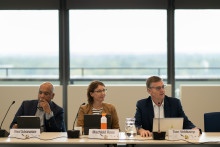Members of the UT community seem to struggle with finding information on how and where to turn for help. This issue was repeatedly mentioned – in relation to the position of the UT Ombuds Officer, the complaints committee, the topic of scientific integrity, and even during a discussion on student wellbeing.
In all the above cases, the Council members stated that the students and staff are often not aware of resources and help offered by the University of Twente. They suggested improving the information on the relevant website pages, such as the House of Integrity, and including clear flow charts that guide people to appropriate help.
‘However, we want to emphasize it is not just about information on the website,’ said Council member Petra de Weerd – Nederhof, when discussing a better visibility of the ombudsman as well as the complaints committee. ‘It is also about the study advisors, confidential advisors and everyone else. They need to understand the resources and be informed.’
A similar point was raised by student Jaime de Bruin (Ureka), who suggested that study associations should be more involved in directing students to suitable help. ‘We hear from multiple sources, such as surveys and associations, that students are struggling. They are lonely and their wellbeing is suffering. Yet, they often don’t know where to get help. Again, communication on resources should be improved. One of the things that could help is having flowcharts at associations. Those are the places you talk informally. Put information in those places. Avoids going through all the layers. If you directly know who to go to, you can solve problems easier, quicker.’
The Executive Board agreed to explore means of communicating more directly and making information easier to obtain. ‘I think it’s a good idea,’ reacted Machteld Roos, Vice-President of the Executive Board. ‘The cry for help is urgent. We’ll look into this.’







